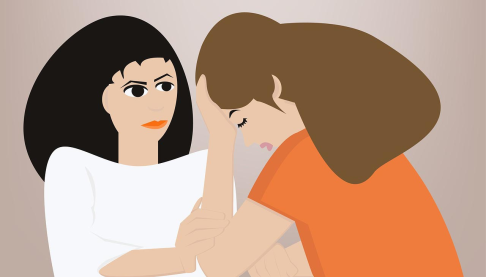Mental Health Awareness Week (12–18 May) celebrates the power and importance of community for our mental health and wellbeing. Feeling connected to others and being part of a safe, supportive community is vital for maintaining good mental health. Explore the role community plays in our lives, alongside topics like loneliness, anxiety and wellbeing, with our FREE courses, interactives and articles written by our academic experts.
-
A Support Net: Can you help someone in need?
Take part now to access more details of A Support Net: Can you help someone in need?All of us will experience personal challenges, but could you make a positive impact on someone's life? Try our wellbeing interactive 'A Support Net' to see if you can help four people.

-
What can I do about my mental health when I don’t have the support I need?
Read now to access more details of What can I do about my mental health when I don’t have the support I need?What can you do if you're not comfortable talking about mental health issues with your peers? Dr Jonathan Leach and Dr Mathijs Lucassen set out six ways of getting the support you need.

-
Work and mental health
Learn more to access more details of Work and mental healthAlthough being at work during periods of mental illness can be difficult for those with mental health problems, most people with these difficulties could take paid employment if it were not for numerous barriers in the workplace and the wider community (Centre for Mental Health, 2013). In this free course, Work and mental health, you will look ...

-
5 quick tips to boost your wellbeing
Read now to access more details of 5 quick tips to boost your wellbeingDo you want to enhance your wellbeing? This article is packed with practical tips to help you boost your mental health – from building positive habits to managing stress and setting healthy boundaries. Small steps can lead to big changes – let’s explore how.

-
Supporting university students with a mental health condition
Learn more to access more details of Supporting university students with a mental health conditionThere is an increasing prevalence of university students who need mental health support and university staff benefit from training on this topic. This course explores this phenomenon, drawing on an Open University study on how staff (tutors) can support students with a mental health condition, and considers both what staff and institutions can ...

-
A perfect day: how well do you know your happiness hormones?
Take part now to access more details of A perfect day: how well do you know your happiness hormones?How to have a good day? Do our choices have an effect on our happiness hormones? Try our interactive activity and see if you can help make Rowan's day better!
-
Outdoor Therapy: The Benefits of Walking and Talking
Read now to access more details of Outdoor Therapy: The Benefits of Walking and TalkingAn area that has been of particular interest is providing traditional talking therapy outdoors. This article explores the pros of connecting with the natural world...

-
Why friendships are vital to your wellbeing
Read now to access more details of Why friendships are vital to your wellbeingIt's well-documented that loneliness can cause depression and have negative effects on health and lifespans, equal to that of smoking. Explore why friends are good for your wellbeing, then invite them round for a catch up - it's important!

-
Do I have mental health problems and should I get some help?
Read now to access more details of Do I have mental health problems and should I get some help?How do we recognise if a reaction to a stressor has developed into a mental health problem? Here's a five point guide...

-
Depression, mood and exercise
Read now to access more details of Depression, mood and exerciseLooking for a few tips on increasing your mood? Dr Jitka Vseteckova explores the relationship between depression and exercise.

-
The benefits of outdoor green and blue spaces
Read now to access more details of The benefits of outdoor green and blue spacesThe COVID-19 pandemic led to an increased focus on the value of participating in nature. This article explores how outdoor spaces can improve our mental health.

-
Engaging with our environment: what are the benefits?
Read now to access more details of Engaging with our environment: what are the benefits?How can a citizen science project, a guided community walk or a park visit help our wellbeing? This article explores how to engage with the outdoors.

-
Exercise and mental health
Learn more to access more details of Exercise and mental healthEach year thousands of pounds are spent on medications to treat conditions such as anxiety and depression. These medications often have negative side effects. Exercise is an alternative treatment that is low cost and has few side effects. In this free course, Exercise and mental health, we will look at the links between exercise and improved ...

-
How to manage the digital-related stress of technology
Read now to access more details of How to manage the digital-related stress of technologyHow can we avoid the stress and anxiety associated with the digital age? Dr Gini Harrison and Dr Mathijs Lucassen give us five tips...

-
Five tips for relaxing during difficult times
Read now to access more details of Five tips for relaxing during difficult timesModern life can leave many of us feeling stressed out. Here Dr Mathijs Lucassen offers five tips so that you can relax.

-
Stress and anxiety in the digital age: the dark side of technology
Read now to access more details of Stress and anxiety in the digital age: the dark side of technologyWhat is it about new technology that is making many of us anxious and stressed? Dr Gini Harrison and Dr Mathijs Lucassen explore the top five stressors:

-
Green care: contact with nature can improve mental health
Read now to access more details of Green care: contact with nature can improve mental healthCan being outside gardening improve our wellbeing? Discover three factors that account for the positive effects of 'green care'.

-
Millennial burnout: building resilience is no answer – we need to overhaul how we work
Read now to access more details of Millennial burnout: building resilience is no answer – we need to overhaul how we workMillennials have been dubbed “the burnout generation”, Rajvinder Samra looks at how the prolonged stress of this can be avoided.

-
Stress and Burnout in Aviation
Read now to access more details of Stress and Burnout in AviationPeople facing life stressors have a higher likelihood of making errors. This combined with fatigue can cause burnout - so how do pilots deal with this?

-
Understanding depression and anxiety
Learn more to access more details of Understanding depression and anxietyThis free course, Understanding depression and anxiety, explores the causes of these mental health issues, with a particular focus on stress. You will consider some risk and causal factors for some depression and anxiety disorders, and learn about the biology and psychology behind them.

-
Exploring anxiety
Learn more to access more details of Exploring anxietyThis free advanced level course, Exploring anxiety, serves as an introduction to masters level study in neurosciences and mental health. Focusing on anxiety, you will consider key issues concerning diagnosis, causes and interventions. You will also learn how to evaluate news items, and to go behind the headlines and begin to explore some of the ...

-
Making sense of mental health problems
Learn more to access more details of Making sense of mental health problemsOver the past century there has been a radical shift in responses to people who experience mental health problems. In this free course, Making sense of mental health problems, you will learn about how key perspectives in the field have made sense of mental health problems. By directly relating key perspectives to a case study, you will reflect ...

-
Five reasons why you should care about mindfulness
Read now to access more details of Five reasons why you should care about mindfulnessMindfulness is about focusing on the present moment, whilst at the same time accepting your feelings, thoughts, and body’s sensations. But why does mindfulness matter?

-
How To Be A Better LGBTQI+ Ally
Take part now to access more details of How To Be A Better LGBTQI+ AllySo you think you're supportive? But are you really an LGBTQI+ ally? Test yourself by using our immersive film-based interactive.

-
Emotions and emotional disorders
Learn more to access more details of Emotions and emotional disordersIn this free course, Emotions and emotional disorders, you will learn about some of the disorders related to the feelings of stress, sadness and anxiety including how these disorders are diagnosed, their biological correlates, and evidence of their possible causes.

-
Exploring the relationship between anxiety and depression
Learn more to access more details of Exploring the relationship between anxiety and depressionThis free advanced level course, Exploring the relationship between anxiety and depression, serves as an introduction to masters level study in neurosciences and mental health. Focusing on anxiety and depression, you will consider key issues concerning diagnosis, causes and interventions, exploring how these conditions relate to each other. You ...

-
Journeying through Wellbeing
Take part now to access more details of Journeying through WellbeingTake a journey through Wellbeing and see how factors such as where we grow up, what happens to us, and our physical health, can all impact on our mental health and wellbeing.

-
Supporting adult learners’ positive mental health
Learn more to access more details of Supporting adult learners’ positive mental healthThis free course provides educators with an introduction to adult learners’ mental health. The course is designed to develop understanding of the impact mental health has on learning, as well as to explore the variety of strategies that can be employed to support adult learners experiencing a range of mental health related challenges.

-
Supporting children's mental health and wellbeing
Learn more to access more details of Supporting children's mental health and wellbeingDo you have a professional or personal interest in the mental health issues affecting young children? Are you working with children or are you a parent or carer? This free course, Supporting children’s mental health and wellbeing, is designed to give insight into the factors that are contributing to our youngest citizens’ poor mental health; ...

-
Introduction to adolescent mental health
Learn more to access more details of Introduction to adolescent mental healthThis free course provides an introduction to adolescent mental health. The course is designed to encourage a greater understanding of mental health issues as well as to explore the variety of strategies that can be employed to support young people.


Rate and Review
Rate this article
Review this article
Log into OpenLearn to leave reviews and join in the conversation.
Article reviews